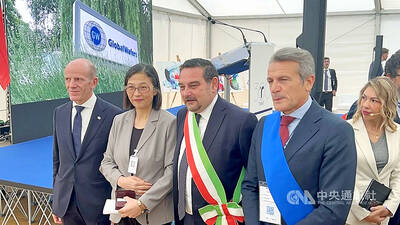Asia Blockchain Accelerator (ABA, 亞洲區塊鏈加速器) yesterday said it aims to support local blockchain applications and founders with a focus on compliance, track record and longevity.
ABA, in collaboration with the ACE Exchange and ACE Blockchain Fund, would provide a wide range of assistance to Taiwanese and foreign blockchain entrepreneurs that includes investment resources, training and business development, it said at a news conference.
ABA aims to build an ecosystem to maximize the business potential of blockchain technology, which is poised to disrupt many aspects of how businesses and economies work, ABA chief executive officer David Pan (潘奕彰) said.
GLOBAL NETWORK
ABA has a global partnership network, which is to provide a great launch pad for blockchain-related start-ups in Taiwan to expand overseas, Pan said.
ABA is subsidized by the Ministry of Economic Affairs’ Small and Medium Enterprise Administration, with the goal of making Taiwan Asia’s blockchain hub.
Blockchain technology has taken the world by storm, with 84 percent of global executives saying that their organizations have some involvement, a PricewaterhouseCoopers survey showed.
The technology’s business value is expected to surpass US$3.1 trillion by 2030, Gartner said.
The Executive Yuan has set a goal of growing the digital industry’s output to NT$6.5 trillion (US$209.7 billion) by 2025.
ABA aims to be the most powerful blockchain accelerator in Asia and create more than NT$1 billion in business value in two years, it said.
“We will incubate at least 10 start-ups and increase partnership value,” Pan said, adding that LongHash, the largest blockchain incubator in Asia, is ABA’s strategic partner.
POSEIDON
Poseidon Network, founded by blog platform Wretch Co (無名小站) founder Light Lin (林弘全), aims to initialize a blockchain-enabled content delivery network in Taiwan, Lin said.
Working with ABA, Poseidon is seeking to prove to the world that it is an example of successful blockchain application.

RECYCLE: Taiwan would aid manufacturers in refining rare earths from discarded appliances, which would fit the nation’s circular economy goals, minister Kung said Taiwan would work with the US and Japan on a proposed cooperation initiative in response to Beijing’s newly announced rare earth export curbs, Minister of Economic Affairs Kung Ming-hsin (龔明鑫) said yesterday. China last week announced new restrictions requiring companies to obtain export licenses if their products contain more than 0.1 percent of Chinese-origin rare earths by value. US Secretary of the Treasury Scott Bessent on Wednesday responded by saying that Beijing was “unreliable” in its rare earths exports, adding that the US would “neither be commanded, nor controlled” by China, several media outlets reported. Japanese Minister of Finance Katsunobu Kato yesterday also

‘DRAMATIC AND POSITIVE’: AI growth would be better than it previously forecast and would stay robust even if the Chinese market became inaccessible for customers, it said Taiwan Semiconductor Manufacturing Co (TSMC, 台積電) yesterday raised its full-year revenue growth outlook after posting record profit for last quarter, despite growing market concern about an artificial intelligence (AI) bubble. The company said it expects revenue to expand about 35 percent year-on-year, driven mainly by faster-than-expected demand for leading-edge chips for AI applications. The world’s biggest contract chipmaker in July projected that revenue this year would expand about 30 percent in US dollar terms. The company also slightly hiked its capital expenditure for this year to US$40 billion to US$42 billion, compared with US$38 billion to US$42 billion it set previously. “AI demand actually

Jensen Huang (黃仁勳), founder and CEO of US-based artificial intelligence chip designer Nvidia Corp and Taiwan Semiconductor Manufacturing Co (TSMC, 台積電) on Friday celebrated the first Nvidia Blackwell wafer produced on US soil. Huang visited TSMC’s advanced wafer fab in the US state of Arizona and joined the Taiwanese chipmaker’s executives to witness the efforts to “build the infrastructure that powers the world’s AI factories, right here in America,” Nvidia said in a statement. At the event, Huang joined Y.L. Wang (王英郎), vice president of operations at TSMC, in signing their names on the Blackwell wafer to

Taiwan-based GlobalWafers Co., the world’s third largest silicon wafer supplier, on Wednesday opened a 12-inch silicon wafer plant in Novara, northern Italy - the country’s most advanced silicon wafer facility to date. The new plant, coded “Fab300,” was launched by GlobalWafers’ Italian subsidiary MEMC Electronics Materials S.p.A at a ceremony attended by Taiwan’s representative to Italy Vincent Tsai (蔡允中), MEMC President Marco Sciamanna and Novara Mayor Alessandro Canelli. GlobalWafers Chairwoman Doris Hsu (徐秀蘭) said the investment marked a milestone in the company’s expansion in Europe, adding that the Novara plant will be powered entirely by renewable energy - a reflection of its